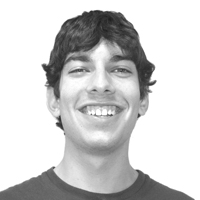
Having grown up as a gay orthodox Jew, this weekend’s incident involving the InterVarsity Christian Fellowship and SHADES really hit home. I feel that as an active member of the campus community and as the editor of Binghamton University’s largest student publication, I can no longer keep quiet.
Let me get this out there first: The InterVarsity Christian Fellowship — as with every other student organization on campus — is entitled to its own opinions and should be allowed to bring whomever it wants to speak on campus. But they crossed the line when they billed the event as an open forum to discuss homosexuality and religion when it was anything but. Plain and simple, the speaker was offensive and put people who may not be fully comfortable with who they are in a position that they shouldn’t have been put in.
Until I got to BU, I had only attended private, religious Jewish schools. In my all-boys Modern Orthodox high school, I attended classes where I learned about the ‘Gay Agenda’ that blocked discourse about homosexuality in America. I was taught how wrong and unnatural homosexuality is and was told that if scientists were allowed to work unencumbered, change would be possible. In my four years there, a single person came out of the closet and he was publicly ridiculed by my peers — in front of teachers — even after he graduated.
These views weren’t surprising in light of the religious right’s characterization of homosexuality as an abominable lifestyle. The leading 20th century authority on Jewish law referred to homosexually as a wicked sin that occurs as an act of rebellion against God. Over 150 rabbis signed a statement declaring that it is impossible that God would create people whose only choice would be to live in sin and therefore the only acceptable solution to “Same Sex Attraction” is therapy and repentance. They aren’t random rabbis either. Some of them are prominent. I prayed in a few of their synagogues and attended lectures given by some of the others.
As someone who still identifies strongly with the religious Jewish community — I keep a strictly kosher kitchen, the Jewish calendar is displayed on my phone’s homescreen and I’m often at Chabad more than once a week — coming out of the closet was a difficult and slow decision. It took a lot of research and a lot of soul searching. I read many articles about people who changed and others about people who were unable to. I looked into the organizations that claim change is possible. Ultimately, though, I came to believe in the accepted position of the American Psychological Association: that homosexuality is normal and that change therapies are not only not effective, but they are also potentially harmful.
But largely my decision to come out was influenced by the culture at this university. People here seemed to accept that being gay is normal. One of my friends had a gay roommate. Someone on my floor, who often hung out in my suite and would later become a good friend, was gay, and nobody thought anything of it. Even the fact that they had boyfriends was viewed no differently than if they had girlfriends. I actually had trouble comprehending how open and accepting everyone was. When I came out, just as I came to expect, nobody cared.
But not everyone at this university is so open and accepting and not every gay person here feels comfortable coming out.
In 2010, as I was still coming to terms with who I am, the Binghamton Review — a fairly prominent magazine on campus — published an article describing homosexuality as an unjustifiable lifestyle that is “unnatural by definition.” It hurt me and nobody said or did anything about it then. So I will not remain silent when incidents like the one on Friday take place. I will publicly proclaim that it is OK to be who you are.
This message is meant for my peers who are still in the closet and to my friend who publicly dates girls but peruses Craigslist for gay hookups on the side.
I will also point out that the discourse is evolving. In January, Alan Chambers, the president of Exodus International — one of the largest Christian ex-gay groups — who himself struggled with homosexuality, said that 99.9 percent of conversion therapy participants do not experience any change to their sexuality and apologized for the group’s “Change is Possible” slogan. In June, he stated on MSNBC that he himself still experiences gay feelings and that he doesn’t believe anybody who proclaims they can cure you.
Our sexuality isn’t changing, but the times are.


